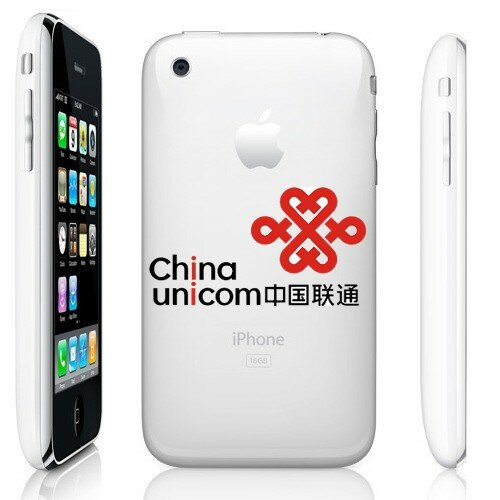It’s now official … iPhone will launch in China during the final quarter of 2009. Alas, Friday’s announcement was short on details and left inquiring minds wanting to know how everything will fall into place. So it’s time to summarize what we know, and ponder a few items from the rumor-mill.
Let’s start with a quote and a cliché …
Quote: “Someone is just makin’ this stuff up” ~ Steve Jobs responding to CNBC reporter Jim Goldman’s question about iPhone in China rumors (Jan 15, 2008).
Cliché: Those who know don’t talk, and those who talk (blog) don’t know.
There is no shortage of iPhone deal chatter coming from China and I’m doing my best to sort through fact and fiction. But I’m talking here, and it’s a safe bet that I don’t know much. In others words, file this post under “speculation.”
 Deal highlights:
Deal highlights:
- 3-year iPhone in China deal
- Target iPhone launch date is sometime in Q4, 2009
- China Unicom () has pre-purchased an undisclosed quantity of iPhones. Prior rumors put the number at 5 million iPhones for $1.46 billion USD.
- There will be subsidies that will reduce iPhone’s retail price for buyers who go on contract (“post pay” customers).*
- There will be multiple plan options with increased iPhone subsidies for buyers who choose expanded (more expensive) plan/service options.
- There will initially be two different iPhone models specially built for the China market, with preloaded apps for Chinese consumers:
- Model A1324 has received its network access and will be based on the iPhone 3G with 8GB and 16GB choices.
- Model A1325 is still in the testing/approval pipeline, but should be approved by targeted launch date (Q4). A1325 will be based on iPhone 3GS with 16GB and 32GB choices.
- Probable iPhone distributors include: China Unicom’s Vsens and major retailers Carrefour (139 stores in China), Dixintong a.k.a. D-Phone (largest handset chain-store in China – Rumors of an iPhone distribution deal with Dixintong go back to Dec 2007), Gome (610 stores – controlled by Huang Guangyu, China’s richest man) and Suning. There were also unconfirmed reports that Best Buy China and Wal-Mart China (158 stores in China) might sell iPhones. Cybermart was also in the mix, but that report was denied by Foxconn (Cybermart’s parent). Last but not least … Apple Stores in Beijing – Sanlitun and soon at Qianmen.
Conflicting reports and rumors:
[Update August 31, 2009: Apple has this is a non-exclusive deal. Apple has re-engaged with China Mobile. Thanks to All Things D for the > mention]
Non-exclusive deal. There were several news services in the US and China that reported the iPhone deal as an “exclusive” for China Unicom. However, the words “exclusive” were conspicuously absent from the August 28th briefing summary posted on China Unicom’s website. There was also no mention of “exclusivity” during China Unicom’s Q2 analysts’ conference where the iPhone deal was announced. By all official communications, the deal is non-exclusive, leaving Apple free to negotiate with other China carriers, most notably with China Mobile ().
 Sorting out the “no-WiFi” reports. Without going down a deep rabbit-hole (explanation of WAPI vs WiFi), suffice to say that the first iPhone “approved” for China (Model A1324) will not include WiFi. This model may, however, include China’s alternative to WiFi, otherwise known as WLAN authentication and privacy infrastructure (WAPI). The second iPhone for China (Model A1325 – based on iPhone 3GS) is a more interesting case. This iPhone was submitted to China’s CTTL for mandatory testing in July. There have been conflicting reports on the “WiFi” status of this second iPhone. Since WAPI is sometimes called “China’s WiFi,” it’s easy to see how reports might get garbled; even more so when English/Mandarin language translations are involved.
Sorting out the “no-WiFi” reports. Without going down a deep rabbit-hole (explanation of WAPI vs WiFi), suffice to say that the first iPhone “approved” for China (Model A1324) will not include WiFi. This model may, however, include China’s alternative to WiFi, otherwise known as WLAN authentication and privacy infrastructure (WAPI). The second iPhone for China (Model A1325 – based on iPhone 3GS) is a more interesting case. This iPhone was submitted to China’s CTTL for mandatory testing in July. There have been conflicting reports on the “WiFi” status of this second iPhone. Since WAPI is sometimes called “China’s WiFi,” it’s easy to see how reports might get garbled; even more so when English/Mandarin language translations are involved.
Okay, let’s try to sort this out … One series of reports from China tech sites/blogs has quoted “inside sources” who claim that iPhone Model A1325 will include WAPI/WiFi in combination. This would not be far fetched, as this WAPI/WiFi stack was recently authorized (May of 2009) by China’s Ministry of Industry and Information Technology (MIIT). Prior to May 2009, WiFi was expressly forbidden on mobile phones. Chinese Netizens have largely ignored this ban as WiFi base-stations cover many urban zones and grey-market (“back of the shop”) WiFi-capable handsets are everywhere. The WiFi ban on officially sanctioned phones has only added fuel to the flourishing grey-market. Consequently, the MIIT felt compelled to throw WiFi a bone by allowing WAPI and WiFi to be stacked together on handsets. This King Solomon’s compromise allows both sides to win. China gets their WAPI standard (and royalty payments) and consumers can get WiFi.
All that said … There have been reports proclaiming loudly that WiFi will not be on iPhone and still other rumors which say yes Model A1325 will include the WAPI/WiFi combo. Bottom line … there is still no clarity on this story. Time will tell.
 Control of the wireless value-added services (WVAS) platform. For more than a year now, China’s telecom industry has been “circling the wagons” to defend against the new breed of “smartphone” manufacturers who would be so bold as to take a share of carriers’ WVAS revenues. China’s MIIT has no doubt been a champion of this “keep revenues in house” campaign. And it’s no coincidence that the “no revenue sharing” mantra has been inserted into virtually every “China telecom source” leak to the media related to the iPhone in China negotiations.
Control of the wireless value-added services (WVAS) platform. For more than a year now, China’s telecom industry has been “circling the wagons” to defend against the new breed of “smartphone” manufacturers who would be so bold as to take a share of carriers’ WVAS revenues. China’s MIIT has no doubt been a champion of this “keep revenues in house” campaign. And it’s no coincidence that the “no revenue sharing” mantra has been inserted into virtually every “China telecom source” leak to the media related to the iPhone in China negotiations.

meteor changed dinosaurs' world
Apple’s () successful platform (iTunes, App Store, MobileMe) has clearly been a concern for China’s telecom industry. They recognize that carriers will either need to come up with compelling platforms of their own (that integrate seamlessly with smartphones) or they stand to lose WVAS revenues to smartphone manufacturers who are attempting to meet, match, mirror, model Apple’s eco-system.
China Unicom and China Mobile are both developing their own proprietary Android-based mobile operating systems and they are also working with numerous handset manufacturers to build their own customized Android-based smartphones (OPhones for China Mobile and UPhones for China Unicom). These OPhones/UPhones are designed to promote the carriers’ own WVAS. Why are the carriers doing this?
-
 Control the customer (“hooks” via customers’ dependence on services)
Control the customer (“hooks” via customers’ dependence on services) - Maximize WVAS revenues and generate higher average revenue per user (ARPU)
- Preempt their greatest fear – becoming “dumb pipes” … The meteor is to the dinosaur as the smartphone/platform is to a “dumb pipe” carrier
 Welcome to the “wild rumors” portion of the show. There have been several reports in the China tech press which claim that China Unicom will use their own platform (not Apple’s) to support music and apps on iPhone. This may be due partially to:
Welcome to the “wild rumors” portion of the show. There have been several reports in the China tech press which claim that China Unicom will use their own platform (not Apple’s) to support music and apps on iPhone. This may be due partially to:
- China’s WVAS (e.g. iTunes/App Store) (i.e. iTunes/App Store server must be located in China for better “monitoring” by authorities)
- MIIT’s push to keep WVAS revenues “in house” for carriers
IF this rumor proves true, that means no Apple-controlled iTunes and App Store on the iPhones for China Unicom. Since seamless iPhone/platform integration is critical, Apple might be wary of users plugging iPhones (requiring new software) into a “carrier-built” alternative platform. I have serious doubts about this “carrier built” rumor. A less kluge option would be for Apple to “help out” by creating a cloned version of iTunes/App Store that can be rebranded for China Unicom. The greatest complexity might be integrating iPhone with China Unicom’s billing systems and developing alternative ways for users to pay for music/apps (the majority of consumers in China do not own a credit card, which is required on iTunes).
Rebranding iTunes/App Store and/or integrating iPhone with a carrier’s platform, is not something Apple would do without careful consideration and substantial compensation.
This brings up an intriguing sidebar … The initial rumors of the iPhone pre-sale to China Unicom leaked in mid-August. The deal reportedly involved a sale of 5 million iPhones for $1.46 billion USD. Now follow me on this one … Apple normally provides software updates to iPhone users at no cost (free). Due to accounting rules related to these “free” updates, Apple recognizes revenues from iPhone sales over a 2-year period. However, the ceding of ownership/control to a China Unicom version of iTunes might also contractually redefine who (Apple or China Unicom?) is responsible for delivering software updates to iPhone owners.
IF, IF, IF (can you tell I want to qualify this) China Unicom is the party legally/technically responsible for delivering iPhone software updates, then Apple might be able to immediately (not over 2-years) recognize the revenues from their iPhone presale to China Unicom. IF the quantity/price presale rumors are true, this would be a nice $1.46 billion add to revenue in the next quarter for Apple (AAPL).
That said, as a wise friend admonished when I floated this notion, “I doubt anyone outside of Apple and China Unicom knows the specifics of the deal, and we can be sure that no one in the know is talking about those specifics right now.”
Disclosure: Long AAPL
* “Post pay” wireless consumers are on a carrier contract. Yet the majority of wireless consumers in China opt for “pre-paid” mobile packages (not on any carrier contract). One reason for the large number of “pre-paid” users is that carrier contracts often require an employer guarantee or government documents such as a residence permit. Many in China choose to avoid providing this documentation.



little quibble about your dinosaur analogy.
It was the volcanos that killed the Big dinosaurs.
Temperature and oxygen level changed.
Little dinosaurs evolved into birds.
[...] exquisite” gifts. iPhones will be on sale at the Apple Store in Sanlitun as well as some 999 points of sale (Carrefour, Gome, Suning, Dixintong, etc.) across [...]